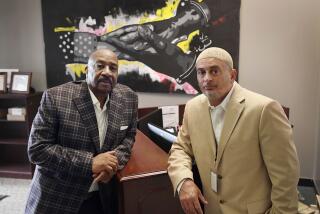Tucker Loses Bid to Cut Restitution
- Share via
Former California Rep. Walter R. Tucker III, who served 27 months in federal prison for extortion and income tax fraud, lost a bid Tuesday to stop the government from quadrupling his restitution payments to $400 a month.
Tucker, free since the end of 1998, said in court papers that he can’t afford the increase because of family financial obligations, including a commitment to tithe his salary to his church.
Defense attorney Robert Ramsey and Assistant U.S. Atty. Daniel Saunders showed up in court Tuesday prepared to argue whether the hike in restitution payments would violate Tucker’s 1st Amendment right to practice his religion.
But U.S. District Judge Consuelo B. Marshall advised the lawyers to save their 1st Amendment speeches for another day.
She said she planned to decide the dispute on the less lofty question of whether the former Compton politician could afford the hike with some judicious budgeting.
Tucker works as the Southern California area director of the Prison Fellowship, a ministry headed by former Watergate figure Chuck Colson. He and his wife, Robin, have a net income of $5,400 a month, Ramsey told the judge.
Of that amount, the lawyer said, Tucker pays about $1,600 a month for the mortgage and association fees at the Culver City condominium he shares with his wife and two sons.
His next biggest outlay is a $540 a month tithing to the Crenshaw Christian Center of Los Angeles, where he is a parishioner. He worked there as coordinator of volunteers immediately after his release from prison.
After various household expenses are paid, Tucker is left with about $200 a month for unbudgeted spending, Ramsey said.
“Two hundred dollars just isn’t that much,” Ramsey said. “There isn’t much play in that. What happens in the event of an emergency?”
The defense lawyer said the U.S. probation office, which ordered the increase, ought to be concerned about letting Tucker get on with his life “rather than trying to put him in the poorhouse.”
Tucker addressed the court briefly, saying, “I have no intent to circumvent my responsibilities.”
In response, Saunders, the government prosecutor, denied that probation authorities were trying to bankrupt Tucker.
He argued that a financial statement prepared by Tucker contained many expenditures that could be pruned, including $150 a month for dry-cleaning and $60 a month for a cell phone.
“If that means some minor modifications in the defendant’s lifestyle, I don’t have a problem with that,” Saunders said.
Marshall agreed, and rejected Tucker’s motion to reduce his restitution payments to $100 a month. In case of an unexpected financial emergency, she said, he should notify his probation officer and request a delay.
Tucker owes the government $30,000, representing the bribe money he took from a businessman-turned-FBI informant while serving as Compton’s mayor in 1991-92. Evidence against Tucker included nearly 30 hours of secretly recorded FBI video that documented payoffs from the businessman, who was seeking permission to build a $250-million waste-conversion plant in Compton.
By the time he was indicted, Tucker had moved on to a Democratic seat in Congress. After his conviction, he resigned from Congress and surrendered his license to practice law. Tucker, an ordained minister, told supporters as he was heading off to Lompoc federal prison that he intended to devote the rest of his life to doing God’s work.
More to Read
Get the L.A. Times Politics newsletter
Deeply reported insights into legislation, politics and policy from Sacramento, Washington and beyond. In your inbox twice per week.
You may occasionally receive promotional content from the Los Angeles Times.










